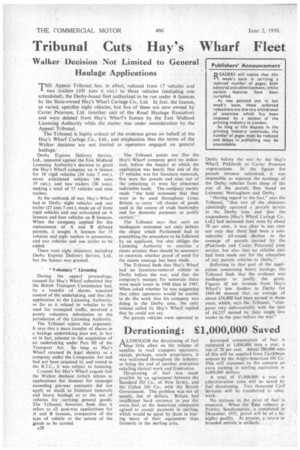Tribunal Cuts Hay's Wharf Fleet
Page 30

If you've noticed an error in this article please click here to report it so we can fix it.
Walker Decision Not Limited to General Haulage Applications
THE Appeal Tribunal has, in effect, reduced from 17 vehicles and I two trailers (101 tons 6 cwt.) to three vehicles (including one articulated), the Derby-based fleet authorized to be run under A licences by the State-owned Hay's Wharf Cartage Co., Ltd. In fact, the licence, as varied, specifies eight vehicles, but five of these are now owned by Carter Paterson, Ltd. (another unit of the Road Haulage Executive) and were deleted from Hay's Wharf's licence by the East Midland Licensing Authority while the matter was under consideration by the Appeal Tribunal. •
The Tribunal is highly critical of the evidence given on behalf of the Hay's Wharf Cartage.Co., Ltd., and emphasizes that the terms of the Walker decision are not limited to operators engaged on general hablage.
Derby Express Delivery Service, Ltd., appealed against the East Midland Licensing Authority's decision to grant the Hay's Wharf company an A licence for 10 rigid vehicles (34 tons 7 cwt.), seven articulated vehicles (46 tons 19 cwt.), and two trailers (20 tons), making a total of 17 vehicles and nine trailers.
At the outbreak of war, Hay's Wharf had in Derby eight vehicles and one trailer (27 tons 7 cwt.), made up of three rigid vehicles and one articulated on A licences and fourvehicles on B licences. When the company applied for the replacement of A and B defence permits, it sought A licences for 15 vehicles and eight trailers in possession, and two vehicles and one trailer to be added There were eight Objectors. including Derby Express Delivery Service, Ltd., but the licence was granted.
" Voluntary " Licensing
During the appeal proceedings, counsel for Hay's Wharf submitted that the British Transport Commission had, by a transfer of shares, acquired control of the undertaking, and that the application to the Licensing Authority, so .far as it related to vehiclesto be used for 'exempted traffic,involved 'a purely voluntary submission to the jurisdiction of the Licensing Authority.
The Tribunal rejects this argument. It says that a mere transfer of shares in a haulage undertaking does not, in law or in fact, amount to the acquisition of an undertaking under Part III of the Transport Act. So long as Hay's Wharf retained its legal identity as a company under the Companies Act and had not been acquired by and vested in the B.T,C., it was subject to licensing.
Counsel for Hay's Wharf argued that the .Walker. decision (which relates to applications for licences for tonnages exceeding pre-war amounts) did not apply so much to furniture removals and heavy haulage as to the use of vehicles for carrying general goods. The Tribunal, however, finds that it refers to all post-war applications for A and B licences, irrespective Of the type of vehicle or the natureof 'the goods to be carried. The Tribunal points out that the Hay's Wharf company gave no indication, before the inquiry at which the application was heard, that one of the 17 vehicles was for furniture removals, five were for parcels and nine out of 'he remaining 11 were for abnormal indivisible loads. The comipany merely made "the bald statement that they were to be used throughout Great Britain to carry all classes of, goods used in the course of trade husbandry and for domestic purposes as public carriers.' ".
The Tribunal says that such an inadequate statement not only defeats the object which Parliament had -in prescribing the procedure to be followed by an applicant, but also obliges the Licensing Authority to -exercise a closer scrutiny than should be necessary to ascertain whether proof of need for the excess tonnage has been made.
The Tribunal finds that Hay's Wharf had no furniture-removal vehicle in Derby before the war, and that the company's receipts for removals there were much lower in 1948 than in 1947. When asked whether he was suggesting that other operators would be unable to do the work that his company was doing in the• Derby area, the only witness called by Hay's Wharf replied that he could not say.
No parcels vehicles were operated in Derby before the war by the Hay's Wharf, Pickfords or Carter Paterson organizations. In the figures for parcels revenue submitted, it was impossible to separate the earnings of the Derby vehicles from those of the rest of the parcels fleet based on Leicester, Nottingham and Derby.
"Having regard to the fact," says the Tribunal, "that two of the objectors admittedly operated a parcels service in the Derby trea and that the respondents [Hay's Wharf Cartage Co., Ltd.] had increased their rates by about 70 per cent., it was clear in our view not only that there had been a considerable all-round decline in the tonnage of parcels carried .by the [Pickfords and Carter Paterson] joint service, but also that no reliable as had been made out forthe allocation of any parcels vehicles to Derby."
Referring to that part of the application concerning heavy haulage, the Tribunal finds that the evidence was inadequate to justify the• grant. Figures Of net revenue from Hay's Wharf's low lOaders in Derby for 1945-48 showed that . an average of about £36,000 had been earned in those years, which, says the Tribunal, "compares very unfavourably with the sUm of .£6,217 earned by their Single low loader in the year before the












































































